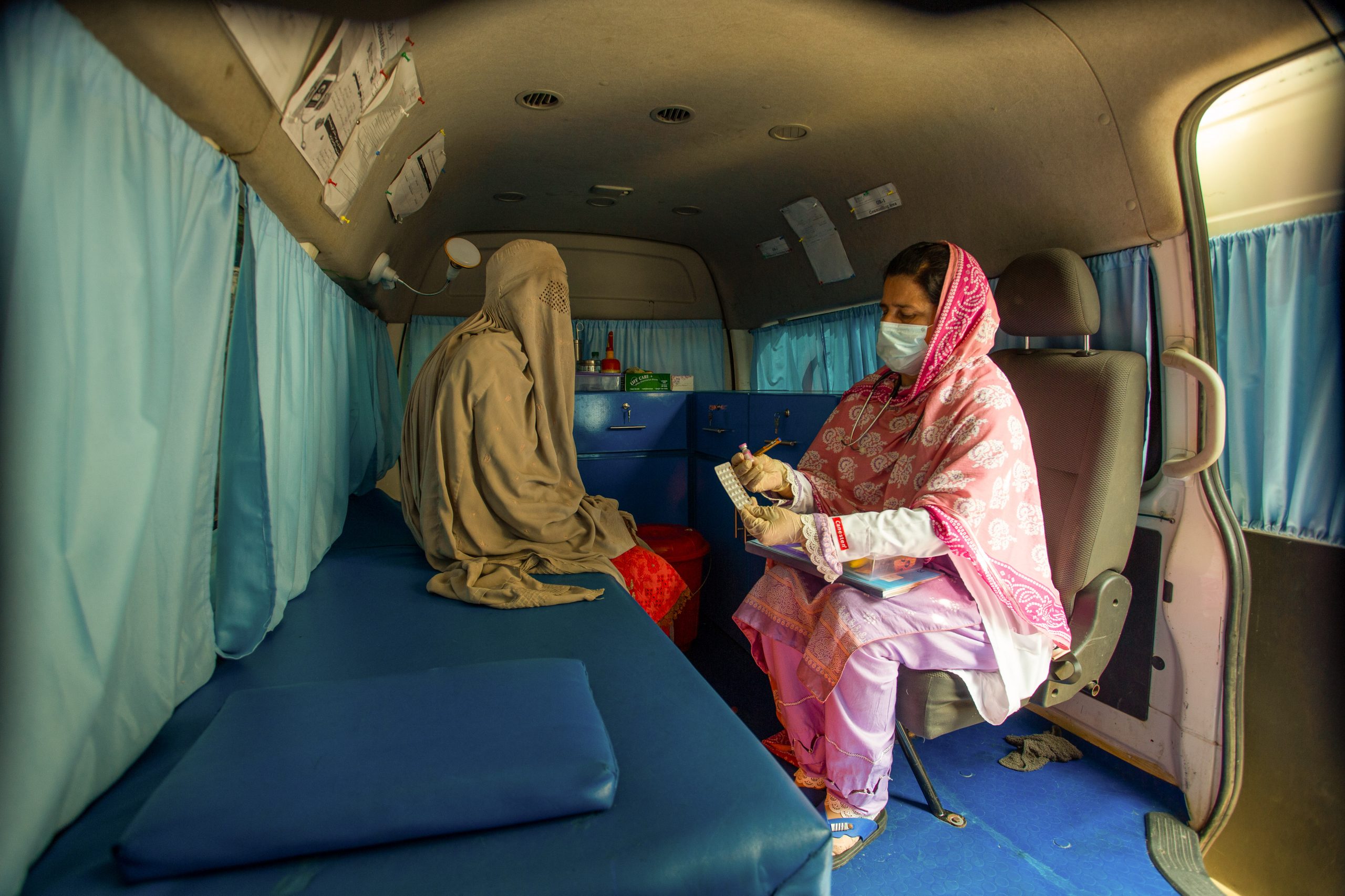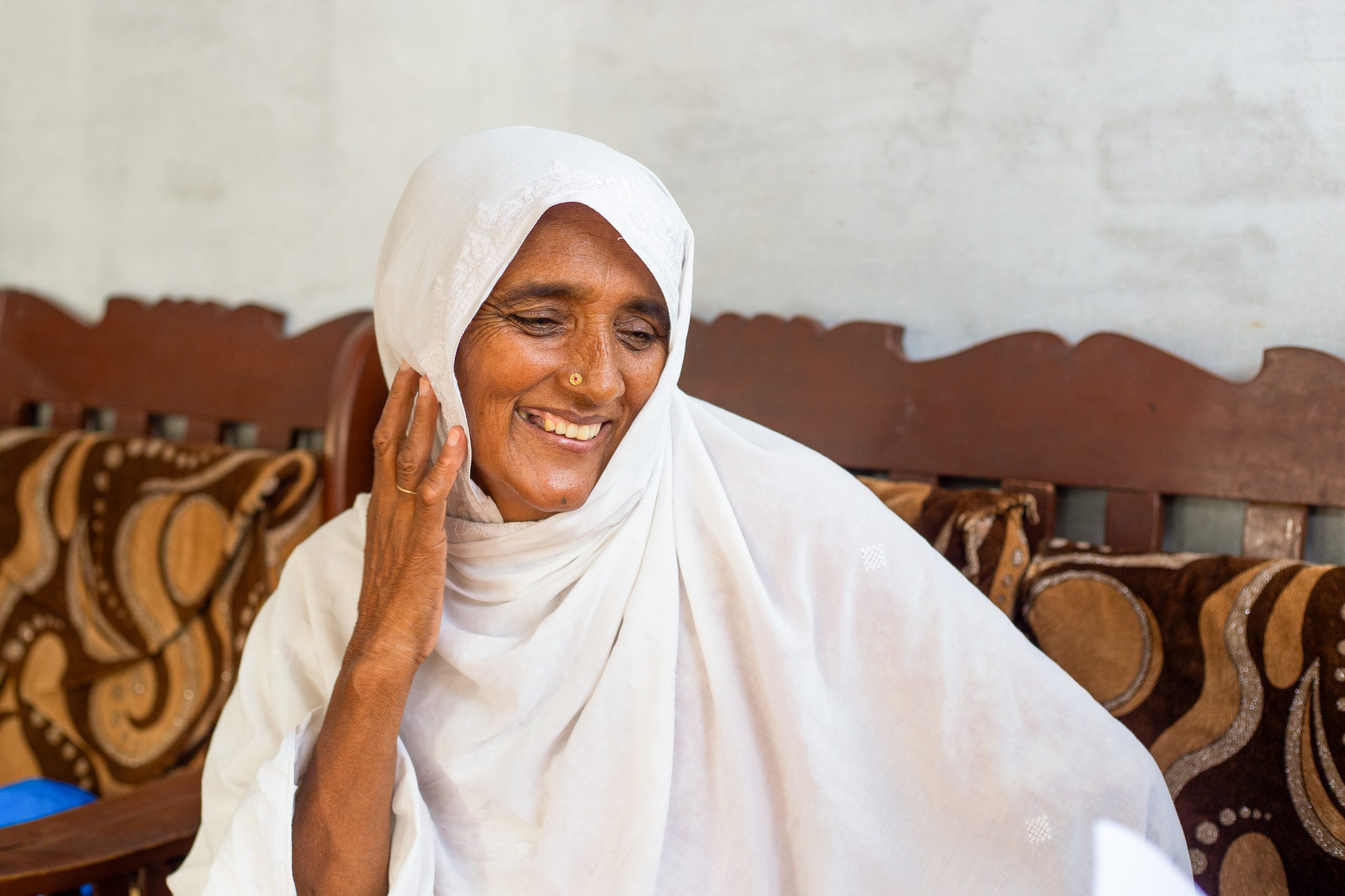In 2022, devastating floods inundated a third of Pakistan and displaced 33 million people. It was women and girls who bore the heaviest burden. Dr. Tasneem Fatima, Director of Health Services for Marie Stopes Society (MSS), Marie Stopes International’s (MSI) partner in Pakistan, relates: “Displaced women came to us seeking antenatal and postnatal care, emergency contraception, condoms, menstrual kits, and clean birth delivery kits. I know of two women who came to us in labour, and our midwives brought them into our care, delivering their babies safely in the back of a van.” During this period of displacement and disaster, it also emerged that women and adolescent girls were facing heightened risks of sexual violence, unintended pregnancy, and unsafe abortion.
Pakistan’s 2022 flooding crisis reaffirmed to the team at Marie Stopes International (MSI) that climate change is not only an environmental crisis, but is also a gendered health crisis. And that Sexual and Reproductive Health Rights (SRHR) must be embedded into climate adaptation strategies.
The challenge.
As the effects of climate change are increasingly apparent, there is growing recognition that women and girls, especially those in the Global South or Majority World, are being disproportionately impacted. However, one critical and often overlooked example of the impact of climate change on women and girls in the Majority World is the fact that their sexual and reproductive health and rights (SRHR) are also being threatened.
A 2023 study by the International Rescue Committee (IRC) found that in Bangladesh’s climate-vulnerable coastal regions, such as Bhola and Shatkhira, child marriage rates surged by 39% following climate-induced disasters. A 2023 study found that a one-degree Celsius increase in temperature is associated with a 6.3% rise in acts of domestic violence among women in three South Asian countries, highlighting the societal consequences of climate-induced stress. A 2021 study found evidence that climate change factors negatively affect maternal and neonatal health outcomes, including increased risks of miscarriages and premature deliveries.
Yet despite this mounting evidence, the SRHR impacts of climate change remain largely overlooked by policymakers and donors. Like other humanitarian emergencies, climate-related disasters disrupt health systems and cut off access to reproductive healthcare. This is especially harmful in regions that already have a high unmet need for contraception and safe abortion.
MSI’s analysis across 26 climate-affected countries found that since 2021 climate-related displacement has disrupted contraception access for an estimated 11.5 million women. If unaddressed, these gaps could lead to millions of unintended pregnancies, unsafe abortions, and preventable maternal deaths.
Reproductive health as climate adaptation.
On the other hand, when women have control over their reproductive lives, they are better positioned to lead disaster preparedness, support recovery efforts, and drive climate solutions. Access to SRHR is especially vital in patriarchal settings, where women are often excluded from decision-making spaces. Reproductive autonomy enables women to participate fully in their families, communities, and economies—even in times of crisis. Avoiding unintended pregnancies, receiving maternal care, and accessing safe contraception are also essential for women to focus on securing food, shelter, and safety for their families. Reproductive healthcare is not secondary—it is foundational to survival and recovery.
Consequently, at MSI we are embedding SRHR into climate adaptation strategies. In countries like Pakistan, Timor-Leste, and Vietnam, we are working with governments and local partners to integrate reproductive healthcare into emergency response and long-term planning. This includes pre-positioning supplies, training midwives and health workers, and using mobile clinics to reach isolated communities. Flexible and innovative funding approaches are also key. They allow us to respond rapidly to on-the-ground realities and deliver tailored support where and when it’s needed most.
During the Pakistan floods, access to SRHR was a lifeline. MSI’s mobile outreach teams reached women in remote, flooded areas with emergency contraception, clean delivery kits, and maternal care. These services gave women a measure of control over their bodies and futures at a time when everything else had been upended.
For example, for Maryam, who lives in a small village near Ratodero, a major disaster-prone area of District Larkana, these services were particularly important. Maryam was introduced to family planning by Saima, an SCS (female health educator) working with the MSS. With seasonal flooding increasingly a threat to her family, livelihood and health, Maryam explained how she was not only grateful for the fact that MSS was “[taking] the time to talk to and guide us regarding our health… [but to also discuss] how the weather is affecting our lives, what makes the rains come at certain times of the year and cause floods, plus what precautions we can take in protecting ourselves and our homes.”
 Image: A medical worker provides medical assistance to a local woman in a mobile clinic at an Outreach Camp in Pakistan. Source: MSI Pakistan.
Image: A medical worker provides medical assistance to a local woman in a mobile clinic at an Outreach Camp in Pakistan. Source: MSI Pakistan.
The path forward: addressing the research, policy and implementation gap.
MSI Asia Pacific is committed to ensuring that SRHR is not overlooked in climate response. We are among the few actors, alongside IPPF, WaterAid and the UNFPA, explicitly working at this intersection, documenting the effects of climate change on women’s reproductive health and integrating SRHR into climate adaptation plans. Our work fills a vital research and advocacy gap and shows that climate resilience starts with reproductive choice.
As the climate crisis intensifies, SRHR must become a core component of global climate strategies. If we want to build a more resilient, equitable world, we must start by ensuring that every woman has the tools to decide if or when to have children, even in the most uncertain times.
Our experience across climate-affected communities shows that SRHR services are not just essential for health. They are critical tools for resilience, equity, and survival in the face of climate disruption.
————————————————–
 Grishma Bista is the newly appointed Executive Officer of MSI Asia Pacific.
Grishma Bista is the newly appointed Executive Officer of MSI Asia Pacific.
She brings over 20 years of experience in gender equality, public health, and international development, with senior roles at IWDA, Care, Oxfam, and UNICEF. She previously led MSI’s program in Timor Leste and has served on the MSI Asia Pacific Board since 2022.
MSI Asia Pacific is part of MSI Reproductive Choices, a global organisation dedicated to ensuring everyone has the reproductive choices they need to determine their own future. Operating across the Asia Pacific region, MSI works to expand access to high-quality contraception and safe abortion services, advocate for reproductive rights, and strengthen health systems to support sustainable change. Through partnerships with governments, NGOs, and local communities, MSI Asia Pacific delivers life-changing healthcare, particularly for women and girls in underserved areas. The organisation is committed to empowering individuals, reducing barriers to care, and advancing gender equality across the region.
Feature image: A family planning consultation in Pakistan. Source: MSI Pakistan.
